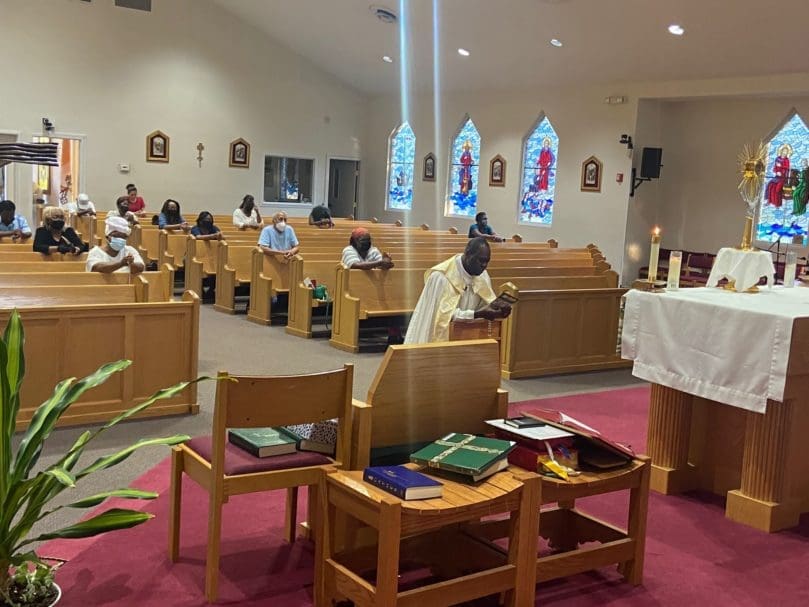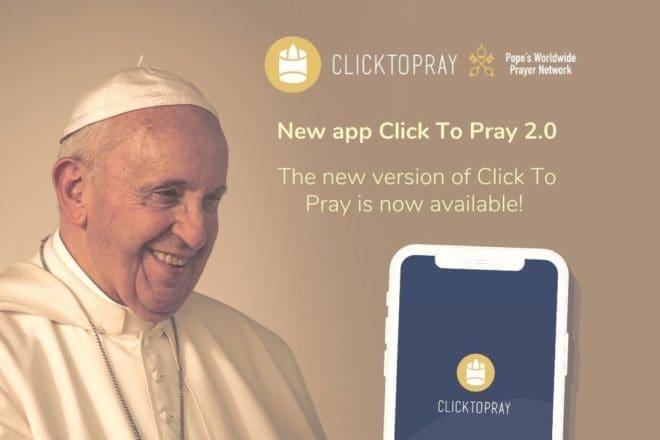 Photo Courtesy of Christ Our Hope Church
Photo Courtesy of Christ Our Hope ChurchAtlanta
‘Move out from of our comfort zone’ says archbishop on synod
By ANDREW NELSON, Staff Writer | Published October 28, 2021 | En Español
ATLANTA—The Archdiocese of Atlanta celebrated the opening of the next Synod of Bishops with Archbishop Gregory J. Hartmayer, OFM Conv., calling for believers “to move out from our comfort zones” to listen and learn from each other to revitalize the church.
This two-year process, he said in his homily on Sunday, Oct. 17, is the chance for the church to engage with women and men “and to go to those who are on the margins of society, those who have felt alienated from the church, or who have left the church, for whatever reason.”
“By listening to their stories, both the joys and the sorrows, then together we can discern under the guidance of the Holy Spirit the way forward for the church.”
He marked the start of the local phase of the global synod of bishops at Mass at the archdiocese’s mother church, the Cathedral of Christ the King. He was joined at the Sunday Mass by Bishop Joel M. Konzen, SM; Bishop Bernard E. Shlesinger III and priests and deacons of the archdiocese. The clergy wore red vestments signifying the Holy Spirit’s role at the Mass and in leading the synod. Scriptures were read in English and Spanish.
The Mass began the “synodal journey,” which will explore the theme, “For a synodal church: communion, participation and mission.” The diocesan phase, which runs until April, is to focus on listening to and consulting with people.
“We are to listen with our hearts so that the people feel they are being heard, not judged, but being heard,” said the archbishop. “They feel free to recount their own experiences and their own spiritual journey without being criticized, without being told to be quiet, but for them to be able to be heard.”
Asking ‘the hard questions’
From his Hispanic mission church in Gainesville, Father Mark Starr said his wish is for the synod to connect the church with young people who question its relevance, and move the church “from maintenance to mission.”
One of his goals is to hear from the variety of cultures represented in the archdiocese on holding on to customs and integrating them into the church, he said.
It’s time for people to ask “the hard questions” of the church and themselves, he said. The synod is not to change church doctrine, but people have questions that should be heard, he said.
“We don’t need to be afraid to ask the tough questions. Ask the hard questions. The church isn’t afraid. I’m not afraid of it,” said Father Starr, who is chairman of the archdiocesan priests council. He is administrator of the St. John Paul II Mission in Gainesville.
Callie Tabor, a leader of a lay-led organization called Catholic Lay Interparish Partnership (CLIP), said the synod is an affirmation of one of the group’s initiatives, increasing co-responsibility for the church between clergy and laity.
“I think it’s very exciting, and it’s also very challenging, because we’re a church that does not find it very natural for things to happen on kind of bottom up approaches,” she said.

A new version of the Click to Pray 2.0 app, available for iOS and Android phones, encourages prayers for the Synod of Bishops. The app is an initiative of the Pope’s Worldwide Prayer Network. CNS photo/courtesy Pope’s Worldwide Prayer Network
Tabor said the inclusion of many voices in setting the direction for the church should become routine.
“It would be a church in which fewer people walked away every day because they were met with indifference, or, quite frankly, a kind of ignorance or hatred towards them as they are,” said Tabor, associate director of the Aquinas Center at Candler School of Theology at Emory University.
Rooted in prayer
The Archdiocese of Atlanta’s website includes introductory Vatican documents explaining the synod’s purpose and a portal for a future online survey.
Catholics here will have the chance to participate in parish listening sessions followed by facilitated sessions across the archdiocese in early 2022.
David Spotanksi, an archdiocesan synod leader and chief operating officer, said he hopes to see participation from faithful parishioners and “those on the margins and those who, through decision or drift, claim no connection to us any longer.”
“The best way for us to reach a child who is no longer active in the church is for their mom and dad to invite them to share why,” he said. “The best way to reach those on the margins is through the people who interact with them every day.”
Jenny Miles, an archdiocesan synod leader and manager of planning and research, said the synod’s success depends on prayer and participants. The essential components of synodality are conversation, listening and speaking with others, she said.
“By rooting the sessions in prayer, we will invite the Holy Spirit to be present and guide the outcomes,” said Miles.
In his homily, the archbishop cautioned the congregation during this time against half-listening because people are invited to share their stories.
“This is not the task of a privileged view or an inner circle. It is the mission of each and every one of us, the people of God, the body of Christ,” he said.
The archbishop said Catholics show respect by seeing each other as believers who encounter Christ with various experiences of life.
“When we listen to someone, whether we agree with them or not, we are to show respect because it is their story. They are their words. It’s their reality, their experience, right or wrong, agree or disagree, it’s theirs and they have a right to be listened to, and they have a right to a forum on which to speak.”
